William Carlos Graves
1886-1946
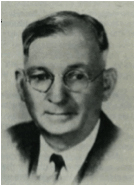
![]()
Life of W.C. Graves
W.C. Graves was converted by S.H. Hall at a gospel meeting in East Point, Georgia in 1912. He would forever after be known as one of "Hall's boys." At brother Hall's insistence, he attended Nashville Bible School and soon began to preach. He moved to Birmingham in 1918. Hall thought enough of him that he devoted an entire chapter in his autobiography to this fine man. William C. Graves was a dedicated and zealous co-worker with John T. Lewis in Birmingham from the 1920s until his death in 1946. It could be said that he was Lewis' right arm, as they worked closely in the cause in one of the most successful works in the country. He became a prolific writer, publishing and editing Truth In Love, a very successful journal. When he began the journal in the early 1920s, it was more of a news journal for the churches in Birmingham. It gradually expanded in size and was tuned towards those who were not members of the church. It reached a subscription list of 24,000, with many subscribers in foreign countries. His health began to fail in the early 40s and he turned the paper over to Marion Davis of Fayette, Alabama who continued publication for several years.
Around 1942, Graves published what I believe to have been his only full-length book, Lessons on the Church of Christ. S. H. Hall had written a book of the same title (published by McQuiddy in 1916 when Graves was a student at NBS. Jack Meyer, in the intro to Graves' book says: "The author, W. C. Graves, has been a resident and gospel preacher of Birmingham, Ala., for 22 years. He has assisted in establishing several congregations, has been the editor of a local gospel paper, is building a substantial business as a dealer in new and used religious books, has materially contributed to the growth of the gospel of Christ in this area, and is correspondingly well known" (pg. 4)….. Anastasia
He started the work among the colored citizens in Birmingham, Alabama.
"Not only did he establish a number of congregations in and around Birmingham for our white brethren, but he is the one who was responsible for Marshall Keeble first visiting Birmingham and establishingthe cause among our colored friends. If I remember correctly, it was in May 1921 when he wrote Brother Marshall Keeble to come to Birmingham for a meeting. He met him at the train, took him to Ensley and found him a place to stay. The meeting lasted three weeks or more, and there were 48 buried into the Lord in baptism. Then the next year Brother Keeble came back and in this meeting there were more than a hundred baptized. He looked after those people until his death, preaching and teaching classes. There are nine well-established colored congregations here now, not to mention mission places." Sixty five years in the pulpit S.H. Hall-pg 37
"Castleberry's first reference (of two) to Graves comes from this early period: "The work among the black people in the area was started in Ensley by W. C. Graves. [He] supported himself as a representative of the Southern Bell Telephone Company" (He Looked for a City, pg. 6).The relationships are never made explicit, but it is reasonable to suppose that Graves became familiar with Marshall Keeble's work through S. H. Hall and through his time in Nashville. At any rate, when Keeble first came to Birmingham in 1921, Graves played a prominent role in that work (Hall, Sixty Years in the Pulpit, pg. 38)…. [This church was likely the forerunner of the Bush Hills church, which is an active congregation today…lw] Keeble returned numerous times over the next few years to hold protracted meetings and to work with this congregation, sometimes staying in Birmingham for over a month at a time. Between visits by Keeble, Graves and James H. Davis (who later served as a deacon and elder at West End) preached and taught for the fledgling congregation." Chris Cotten – blog Anastasia
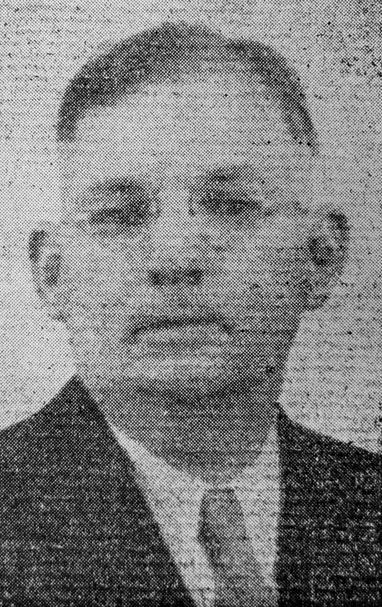
Brother Graves wrote for the Gospel Advocate and was the front page editor of Sound Doctrine, a journal published in Montgomery in the 1940s. He preached regularly for the Tarrant City congregation for seven years; all while holding a full time executive position with Bell Telephone Company. He was a tireless worker for the Lord's cause.
Among the words spoken to an overflow gathering of grieving mourners, by Emerson Estes, at his funeral, were these wonderful comments about the man and his life. "Thou shalt come to thy grave in a full age, like as a shock of corn cometh in his season." (Job 5:26) For Brother Graves the harvest has come, but he spent many years sowing seed that will continue to produce fruit as long as time shall last. He will ever live in the hearts of all who knew him. The lesson that he taught us shall ever be a beckoning light to "come up higher" and through diligent study and prayerful devotion partake of the promises of God. His life was spent in the service of God and in communion with him. What could be more inspiring to those of us who knew him best? ….not only to me has he been a great source of help and encouragement, but he has trained many young men in the way, and they too are out proclaiming the gospel of Christ because of his teaching and godly influence over them. He has been instrumental in establishing several congregations, and only a few days prior to his death he was teaching classes, training both young and old to be a greater power for the cause of our Lord here on earth. He has been engaged in this wonderful work here in Birmingham for the past thirty years. Many thousands of people have right and reason to rejoice that W.C. Graves lived on this earth. The world is a better place by his having passed through it. Many have been brought to Christ and many Christians have been built up and strengthened in the faith through his preaching and writing."
The following is both a tribute and an obituary of this good man by his good friend, Cecil Douthitt.
"In a BirmIngham (Ala.) hospital, on September 24, 1946, the spirit of W. C. Graves, a true gospel preacher and efficient elder of the Fairview church of Christ, in Birmingham, left the earthly house of his tabernacle and returned to God for the eternal reward that awaits the faithful. Brother W. C. Graves had been in falling health for many months; and though I knew he probably could not remain long on the earth, yet I was shocked and grieved when a letter came from his daughter, Frances, stating that he had gone. . For thirty years or more he preached in the Birmingham area, and during that time few men, if any, worked harder for the cause of Christ than dId he. He earned his living by working for the telephone company, in which he held a responsible executive position for many years. He never retained much of this world's goods, but he gave freely to those less fortunate and for the furtherance of the gospel of Christ. Many congregations have been planted and developed through the efforts of W. C. Graves. About twenty-five years ago he paid all expenses for a meeting conducted by Marshall Keeble for the colored people of Birmingham. Approximately one hundred twenty-five colored people were baptized and a church was set In order. As a result of that work there are now about four or five colored congregations in that city. He was the founder and for many years the editor and publisher of Truth in Love. Because of ill-health he was compelled several years ago to turn this work to others. He believed the printed page was a mighty factor for the progress of the gospel, and during all those years in which he was trying to regain his health he longed to get back into the publishing business. Therefore, only a few months ago (before he was physically able to undertake such a task) he began the publication of another monthly paper, Grace and Truth, which was gaining rapidly in circulation and favor among the churches. He was also the author of several tracts and booklets. He preached everywhere he could get the people to listen. His abundant labors overtaxed his physical heart, and I believe he was as much a casualty of the spiritual warfare as were the martyrs of old. Though he knew well the dangers to which his strenuous labors exposed him, he continued in the line of battle under the banner of the Christ whom he loved so much.
When I moved to Birmingham in 1930, I met Brother Graves for the first time. For five years we worked together for a common cause and with a mutual purpose. A friendship that I shall cherish through life developed between us. I loved him for his sincerity and his willingness to make personal sacrifices for the salvation of others. Through the years we have kept In touch with each other, and many letters have passed between us. Last May, while in a meeting with the church in which he was an elder, I frequently visited in his home, and we had many long talks, sometimes far into the night. When he was reminded of the sacrifices he was making and the enormous amount of work he was doing and the dangers to his health, he said it was only through the help of Sister Graves and his daughter, Frances, and the grace of God that he was able to publish the paper; but he made it clear that he was determined to carry on regardless of the risk to which his life was exposed.
Sister Graves and Frances have my genuine sympathy. Human words always seem exceedingly inadequate when our friends are bereft of their loved ones: however, I pray that the assurance of Christian sympathy and brotherly love of so many of their friends may, in some degree at least, assuage their grief and alleviate the pain in their hearts. In this hour of their sorrow as they meditate on the Kindly deeds and pure life of this godly man, devoted husband, and loving father, they will find comfort and courage in the many promises of our heavenly Father to all who live, labor, and love as did W. C. Graves.
Therefore, I commend them to the loving care of God and to the word of his grace; and since they themselves are true Christians, of course our heavenIy Father will comfort, strengthen, and give them hope and courage. They have put their· trust in God, and he will not fail them nor forsake them. The AlmIghty wants us to cast all our anxiety on him, for he is abundantly able to disperse the shadows and give us peace"…..GA Oct 10, 1946
Eternity alone can tell the good he did before he left us. He being dead, yet speaketh….-Larry Whitehead, editor, Alabama Restoration Journal
![]()
Report of the Death of W.C. Graves
On September 24, 1946, W.C. Graves passed away at a Birmingham hospital after a short illness. He had been in failing health for the last two or three years. He was 60 years of age at the time of his passing.
Brother Graves had been an outstanding influence among the churches of Christ in this section for about 30 years. He was a preacher of excellent ability, and a prolific and pungent writer. His stand for the truth was always understood to be sound; he had but little patience with preachers who preached soft, or with church members who wanted it preached that way. It was not necessary to be long in doubt about his position on any question.
He preached in and around Birmingham all of his thirty years of work; was instrumental in helping to establish several of the congregations in this district; and encouraged several young men to preach the Gospel.
He was author of several booklets, tracts, and courses of Bible study. At one time he was Editor and Publisher of Truth in Love, but disposed of it when his health failed. At the time of his death he was Editor and Publisher of Grace and Truth, a monthly evangelistic magazine.
Brother Graves worked hard, in fact, too hard for his own good and health, and as a result departed this life sooner than otherwise. His influence will be sadly missed by all in this section. We pray that our loss will be heaven's gain.
-The Way Of Life, October, 1946, page 8
![]()
Directions To The Grave of William C. Graves
W.C. Graves is buried in the Elmwood Cemetery in Birmingham, Alabama, USA. In Birmingham take I-65 to Exit 258, Dennison Ave./Hwy.18. and head west. Turn right on Martin Luther King Jr. Dr. and the cemetery entrance will be a mile on your left. The cemetery is hundreds of acres in size. It is best to go by the office and get instructions on how to find the grave. To help find graves click on map below to see location. Also buried in this cemetery is another Restoration Movement preacher, C.A. Norred.
GPS Location
33°29'10.4"N 86°50'49.6"W
or D.d. 33.486233,-86.847102
View Larger Map
![]()
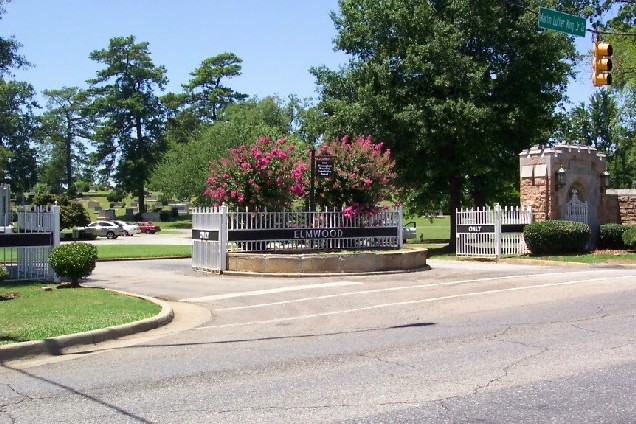
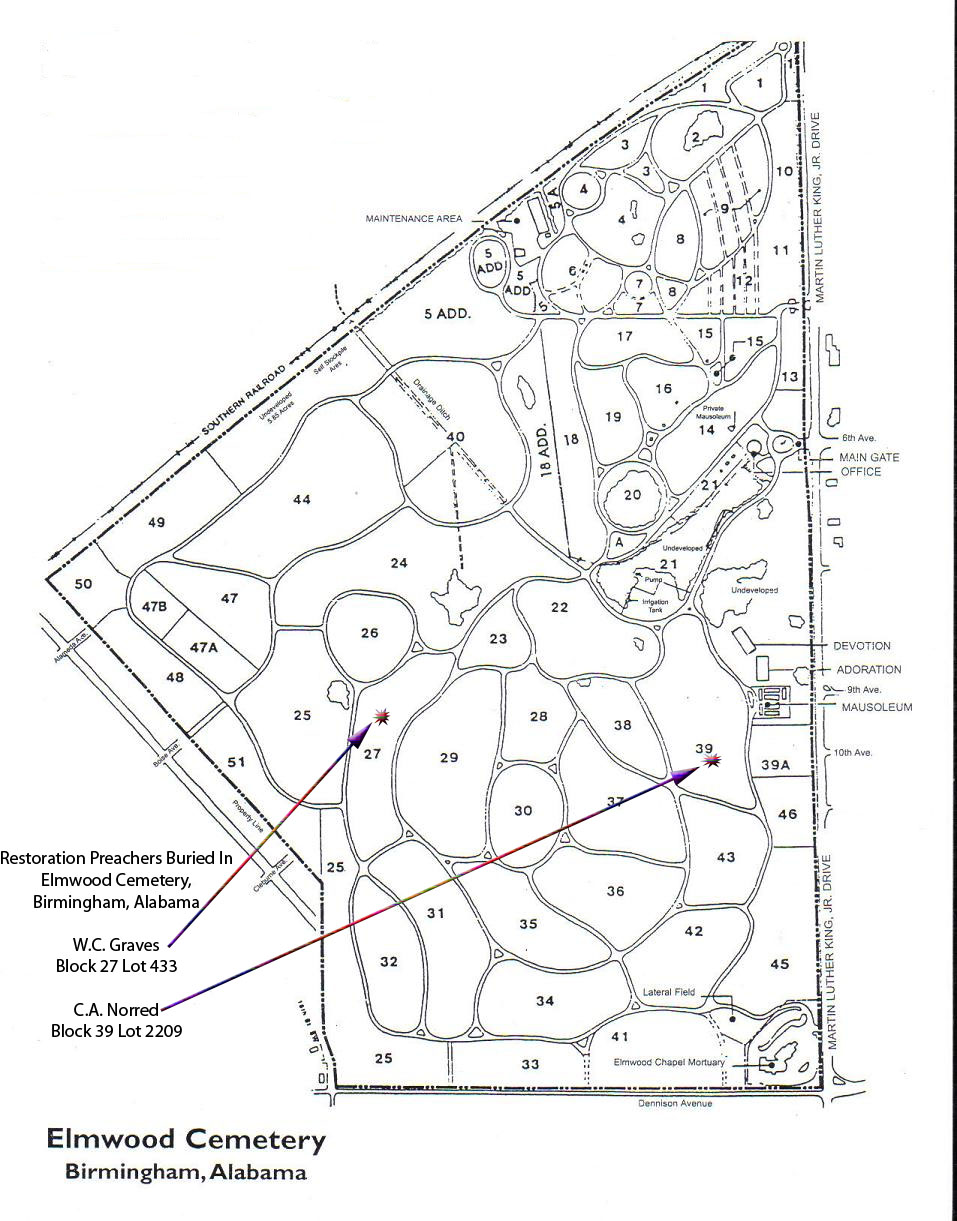
Elmwood Cemetery Map
Click to Enlarge
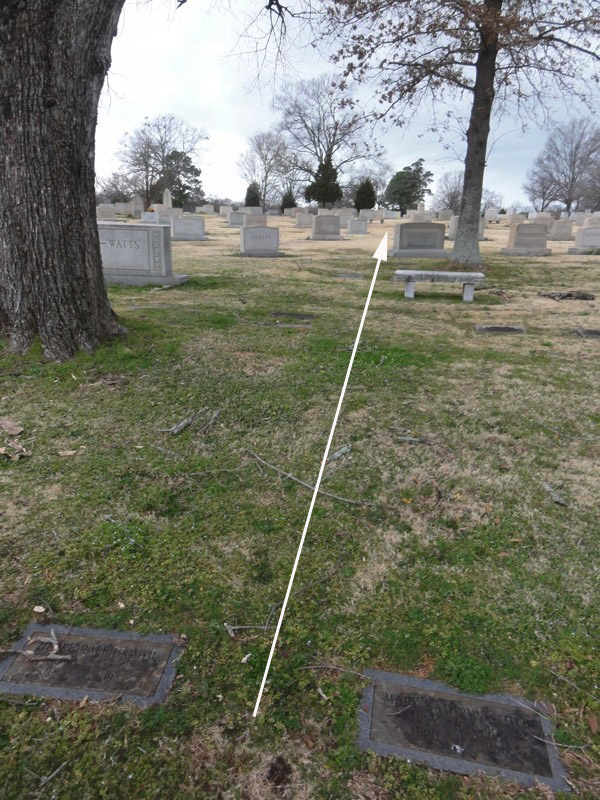
Taken From Curb inside of Block 27
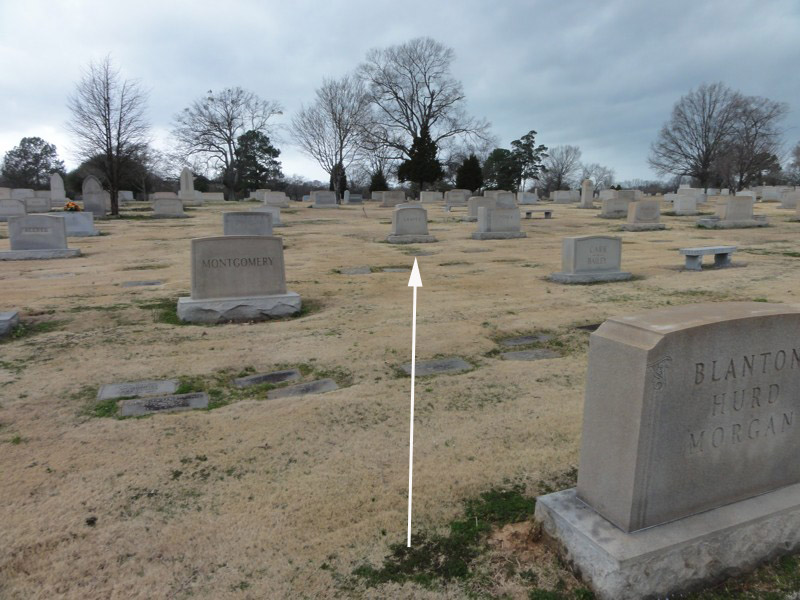
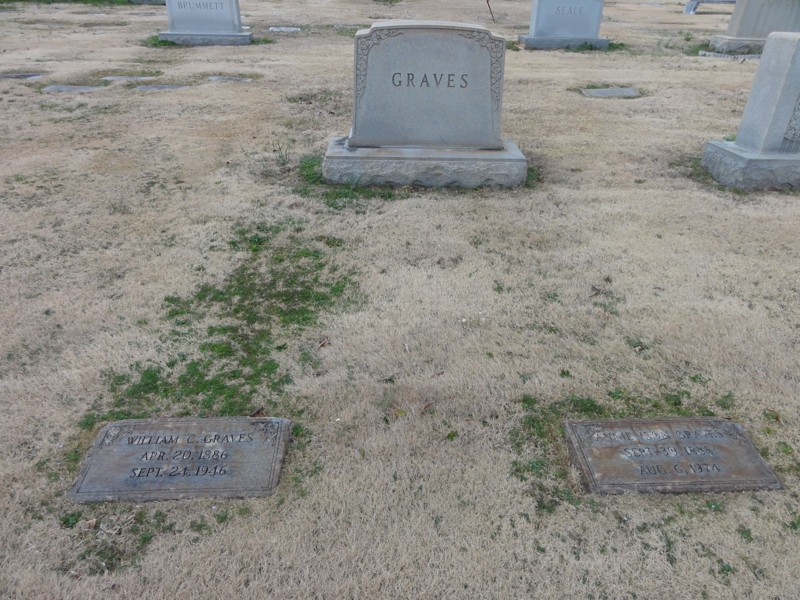
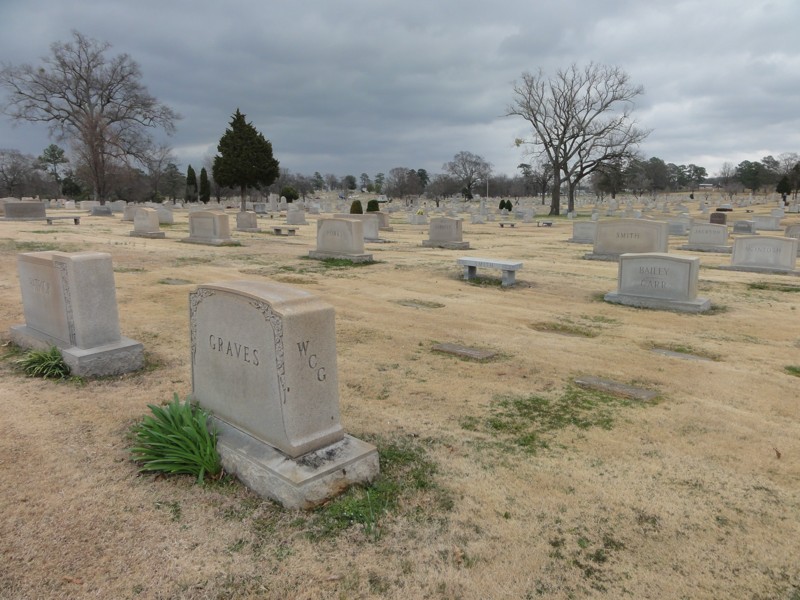
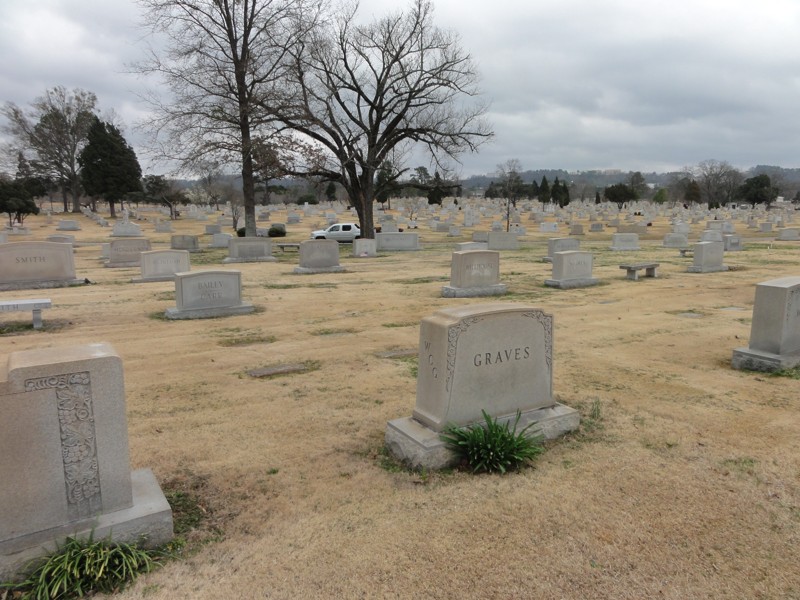
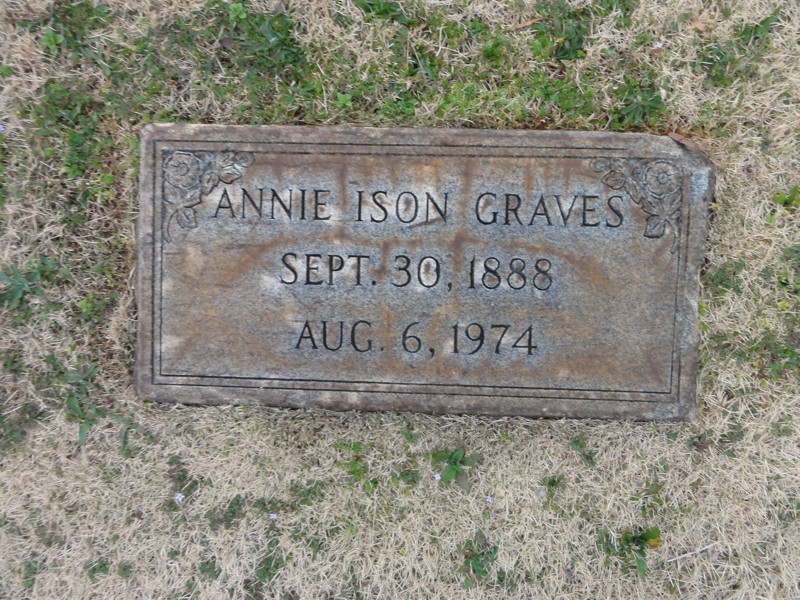
Annie Ison Graves
September 30, 1888
August 6, 1974
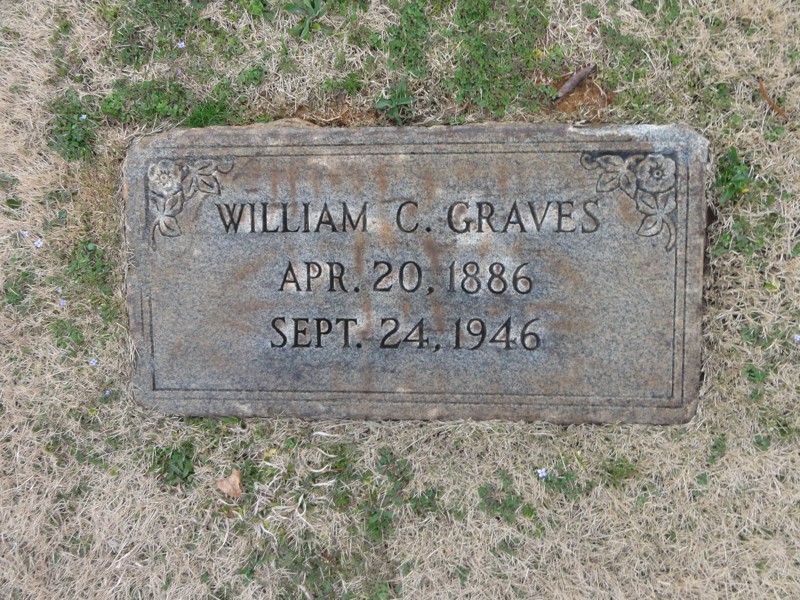
William C. Graves
April 20, 1886
September 24, 1946
![]()
Photos Taken 03.05.2013
Website produced 03.15.2013
Courtesy of Scott Harp
www.TheRestorationMovement.com
![]()